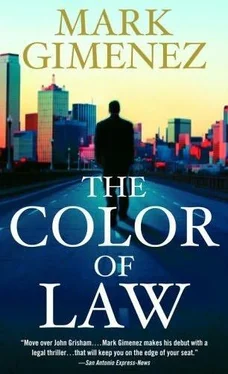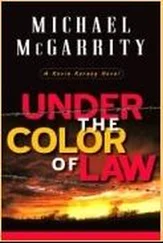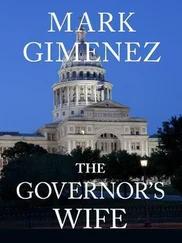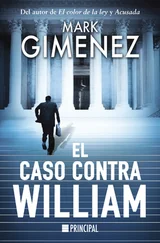Mark Gimenez - The Color of Law
Здесь есть возможность читать онлайн «Mark Gimenez - The Color of Law» весь текст электронной книги совершенно бесплатно (целиком полную версию без сокращений). В некоторых случаях можно слушать аудио, скачать через торрент в формате fb2 и присутствует краткое содержание. Жанр: Криминальный детектив, на английском языке. Описание произведения, (предисловие) а так же отзывы посетителей доступны на портале библиотеки ЛибКат.
- Название:The Color of Law
- Автор:
- Жанр:
- Год:неизвестен
- ISBN:нет данных
- Рейтинг книги:3 / 5. Голосов: 1
-
Избранное:Добавить в избранное
- Отзывы:
-
Ваша оценка:
- 60
- 1
- 2
- 3
- 4
- 5
The Color of Law: краткое содержание, описание и аннотация
Предлагаем к чтению аннотацию, описание, краткое содержание или предисловие (зависит от того, что написал сам автор книги «The Color of Law»). Если вы не нашли необходимую информацию о книге — напишите в комментариях, мы постараемся отыскать её.
The Color of Law — читать онлайн бесплатно полную книгу (весь текст) целиком
Ниже представлен текст книги, разбитый по страницам. Система сохранения места последней прочитанной страницы, позволяет с удобством читать онлайн бесплатно книгу «The Color of Law», без необходимости каждый раз заново искать на чём Вы остановились. Поставьте закладку, и сможете в любой момент перейти на страницу, на которой закончили чтение.
Интервал:
Закладка:
“Murder, that’s the crime your prostitute is charged with.”
“Yes.” Reading again: “‘To be confronted with the witnesses against him.’ That means the prosecution must put the witnesses on the stand in court to testify against the defendant. ‘To have compulsory process for obtaining witnesses in his favor.’ That means you can call witnesses to help you.”
“Your prostitute can get people to say she didn’t do it.”
“Right. If she can find anyone. And to have the assistance of counsel for his defense.’”
“What’s counsel?”
“A lawyer.”
“Your prostitute has a right to a lawyer?”
“Yes, she does.”
“Even if she can’t pay you?”
“Yes.”
“Why?”
“Why what?”
“Why does she get you for free when everyone else has to pay you three hundred and fifty dollars an hour?”
“Well, George Washington and the other Founding Fathers…you know about them?” She nodded. “Well, they didn’t think it would be fair for the government to charge someone with a crime but not give him a lawyer to defend him.”
“Because he might be innocent and if he didn’t have a lawyer to prove he’s innocent, he might still go to jail.”
“Exactly…well, the lawyer doesn’t have to prove him innocent, the government’s got to prove him guilty. And that’s the lawyer’s job, Boo, to make the government prove the defendant’s guilt beyond any reasonable doubt.”
“So the government proved your prostitute is guilty?”
“Not yet. And she’s not my prostitute, Boo. She’s my client.”
“But you wanted her to cop a plea, say she’s guilty.”
“Yes, to confess that she did it.”
“So the government wouldn’t have to prove she’s guilty.”
“Right.”
“Then why does she need you?”
Scott chuckled. “Well, I’m supposed to, uh…I mean, the court appoints a lawyer so she, uh…Well, the Bill of Rights says she has a right to a lawyer even if she’s guilty and decides to confess. To make sure the rules are followed.”
“And the judge appointed you to make sure the rules are followed for her?”
“Yes, but she doesn’t want to confess. She wants to go to trial, so I hired her out.”
She frowned. “Explain.”
“I hired an old law school buddy to take her case to trial.”
“Why?”
“Because I’m too busy.”
“You’re too busy to make the government prove she’s guilty?”
“Yes. So I’m paying a friend to do it for me.”
“Like if I hired a friend to do my homework?”
“Exactly…well, no, not exactly. You’ve got to do your own homework, Boo.”
“Why?”
“Because that would be cheating.”
“But it’s not cheating if you’re a lawyer?”
“Yes…well, no. I mean…it’s complicated, Boo.”
She pointed at the book. “Does that Sixth Amendment have one of those things, what did you call it, a pro…prov…”
“Proviso?”
“Yeah, a proviso.”
“What do you mean?”
“A proviso that if the lawyer’s real busy, you don’t have a right to a lawyer?”
“No. But you don’t have the right to a particular lawyer, just a lawyer.”
“Any lawyer?”
“Yeah.”
“Even a bad lawyer?”
Scott shrugged. “Yeah.”
“Is your friend a good lawyer or a bad lawyer?”
“Well…I don’t really know.”
“Is he as good as you?”
Scott smiled. “No.”
“So the judge appointed you as her lawyer and you’re a great lawyer, but now she’s going to get stuck with your friend, who’s not so great?”
“Well, yeah. Not everyone can have me as their lawyer.”
“Only corporations that can pay you three hundred and fifty dollars an hour.”
“Exactly.”
She sighed. “That doesn’t seem like such a great deal.”
“What?”
“That right to a lousy lawyer.”
EIGHT
The next morning, Scott was back at the federal building at a quarter till nine, anxious to punt Shawanda Jones to Bobby Herrin and get back to his perfect life. Outside, he was mobbed by TV cameras and reporters sticking microphones in his face and shouting questions. He pushed his way through with several “No comments” and entered the courthouse. He rode the elevator to the fifteenth floor where he found Bobby standing outside Judge Buford’s courtroom, wearing the same awful suit and smelling of cigarette smoke. They entered through tall double doors and took a seat in the church pews with the other lawyers awaiting their clients’ hearings, arraignments, and sentencings.
For the last three decades, Judge Samuel Buford had presided over this courtroom. And looking at the waiting defendants, the drug dealers up on federal charges, black and brown and nervous, and the white-collar criminals, white and well-groomed and indignant that tax dollars were being wasted prosecuting them for securities and tax fraud-all wondering if they would be going home on probation or to the federal penitentiary for five to ten-Scott couldn’t help but consider all the lives that had been changed in this one courtroom by this one judge. For raw power, it was hard to beat the law.
The bailiff called the first case on the docket: “United States of America versus Shawanda Jones.”
Scott put on his glasses-he always wore his glasses to court-and he and Bobby stood and stepped past the bar and to the defendant’s table. A preppy lawyer, midthirties, walked over to them.
“Bobby, what, you moving up to the big leagues?” the lawyer said. His smirk indicated that it was a smart-ass comment, not a compliment. “I didn’t know you were on this case.”
“Just trying to help an innocent citizen being railroaded by an overzealous government prosecutor, Ray,” Bobby said in a deadpan voice.
Ray chuckled and said, “Yeah, right,” then extended his hand to Scott. “Ray Burns, Assistant U.S. Attorney.”
Scott shook hands with Burns and said, “Scott Fenney, Ford Stevens.”
“I heard Buford tapped private counsel for this case,” Burns said. He turned his palms up and glanced from Scott to Bobby and back. “So, what, you bailing on the defendant?”
“No, I’m not bailing. I’m trying to do the right thing, hiring her a real criminal defense attorney.”
“The right thing?” Burns said with the same smirk, clearly his trademark expression. “Looks an awful lot like bailing to me.”
Ray Burns, Assistant U.S. Asshole, returned to the prosecution table, his right shoulder riding low under the weight of the king-sized chip he was carrying around. Government lawyers always have chips on their shoulders when dealing with big-firm lawyers like Scott because the big firms didn’t hire them out of law school: if you can, you do; if you can’t, you teach; if you can’t teach, you hire on with Uncle Sam.
Bobby leaned in and whispered, “Burns is a dick. Trying to build a conviction record so he can move up to D.C. Asshole’s put a couple of my clients away for life, for possession. Course he called it ‘intent to distribute.’”
A side door opened and a strange black woman appeared in a white jail uniform. Scott stared at the woman for several seconds before realizing that she was Shawanda. She had looked awful yesterday; today she looked like she was dying. The same black guard escorted her into the courtroom, his arm under hers, almost carrying her over to Scott. By the time she arrived, her face was a brown frown.
“Morning, Shawanda.”
Her entire body was trembling, shaking, twitching. Scott almost reached out and embraced her, to warm her like he did Boo when she got a chill after getting out of the pool, but at the last second the thought of his client throwing up on his expensive suit dissuaded him. He eased a step away from her.
Читать дальшеИнтервал:
Закладка:
Похожие книги на «The Color of Law»
Представляем Вашему вниманию похожие книги на «The Color of Law» списком для выбора. Мы отобрали схожую по названию и смыслу литературу в надежде предоставить читателям больше вариантов отыскать новые, интересные, ещё непрочитанные произведения.
Обсуждение, отзывы о книге «The Color of Law» и просто собственные мнения читателей. Оставьте ваши комментарии, напишите, что Вы думаете о произведении, его смысле или главных героях. Укажите что конкретно понравилось, а что нет, и почему Вы так считаете.












